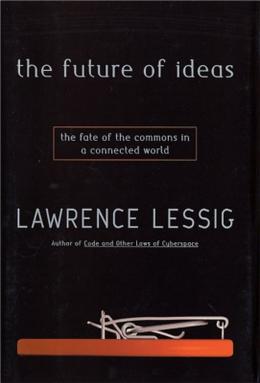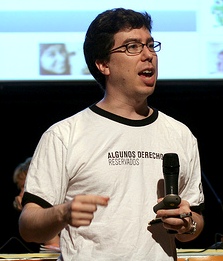Creative Commons (CC) is an American non-profit organization and international network devoted to educational access and expanding the range of creative works available for others to build upon legally and to share. The organization has released several copyright licenses, known as Creative Commons licenses, free of charge to the public. These licenses allow authors of creative works to communicate which rights they reserve and which rights they waive for the benefit of recipients or other creators. An easy-to-understand one-page explanation of rights, with associated visual symbols, explains the specifics of each Creative Commons license. Content owners still maintain their copyright, but Creative Commons licenses give standard releases that replace the individual negotiations for specific rights between copyright owner (licensor) and licensee, that are necessary under an "all rights reserved" copyright management.

Lester Lawrence Lessig III is an American legal scholar and political activist. He is the Roy L. Furman Professor of Law at Harvard Law School and the former director of the Edmond J. Safra Center for Ethics at Harvard University. Lessig was a candidate for the Democratic Party's nomination for president of the United States in the 2016 US presidential election but withdrew before the primaries.

The Future of Ideas: The Fate of the Commons in a Connected World (2001) is a book by Lawrence Lessig, at the time of writing a professor of law at Stanford Law School, who is well known as a critic of the extension of the copyright term in US. It is a continuation of his previous book Code and Other Laws of Cyberspace, which is about how computer programs can restrict freedom of ideas in cyberspace.

Jonathan L. Zittrain is an American professor of Internet law and the George Bemis Professor of International Law at Harvard Law School. He is also a professor at the Harvard Kennedy School, a professor of computer science at the Harvard School of Engineering and Applied Sciences, and co-founder and director of Harvard's Berkman Klein Center for Internet & Society. Previously, Zittrain was Professor of Internet Governance and Regulation at the Oxford Internet Institute of the University of Oxford and visiting professor at the New York University School of Law and Stanford Law School. He is the author of The Future of the Internet and How to Stop It as well as co-editor of the books, Access Denied, Access Controlled, and Access Contested.

A Creative Commons (CC) license is one of several public copyright licenses that enable the free distribution of an otherwise copyrighted "work". A CC license is used when an author wants to give other people the right to share, use, and build upon a work that the author has created. CC provides an author flexibility and protects the people who use or redistribute an author's work from concerns of copyright infringement as long as they abide by the conditions that are specified in the license by which the author distributes the work.

Free Culture: How Big Media Uses Technology and the Law to Lock Down Culture and Control Creativity is a 2004 book by law professor Lawrence Lessig that was released on the Internet under the Creative Commons Attribution/Non-commercial license on March 25, 2004.
"A Rape in Cyberspace, or How an Evil Clown, a Haitian Trickster Spirit, Two Wizards, and a Cast of Dozens Turned a Database into a Society" is an article written by freelance journalist Julian Dibbell and first published in The Village Voice in 1993. The article was later included in Dibbell's book My Tiny Life on his LambdaMOO experiences.

Remix culture, also known as read-write culture, is a term describing a culture that allows and encourages the creation of derivative works by combining or editing existing materials. Remix cultures are permissive of efforts to improve upon, change, integrate, or otherwise remix the work of other creators. While combining elements has always been a common practice of artists of all domains throughout human history, the growth of exclusive copyright restrictions in the last several decades limits this practice more and more by the legal chilling effect. In reaction, Harvard law professor Lawrence Lessig, who considers remixing a desirable concept for human creativity, has worked since the early 2000s on a transfer of the remixing concept into the digital age. Lessig founded the Creative Commons in 2001, which released a variety of licenses as tools to promote remix culture, as remixing is legally hindered by the default exclusive copyright regime applied currently on intellectual property. The remix culture for cultural works is related to and inspired by the earlier Free and open-source software for software movement, which encourages the reuse and remixing of software works.

The free-culture movement is a social movement that promotes the freedom to distribute and modify the creative works of others in the form of free content or open content without compensation to, or the consent of, the work's original creators, by using the Internet and other forms of media.

The Cult of the Amateur: How Today's Internet Is Killing Our Culture is a 2007 book written by entrepreneur and Internet critic Andrew Keen. Published by Currency, Keen's first book is a critique of the enthusiasm surrounding user-generated content, peer production, and other Web 2.0–related phenomena.

Code and Other Laws of Cyberspace is a 1999 book by Lawrence Lessig on the structure and nature of regulation of the Internet.
Information technology law concerns the law of information technology, including computing and the internet. It is related to legal informatics, and governs the digital dissemination of both (digitized) information and software, information security and electronic commerce aspects and it has been described as "paper laws" for a "paperless environment". It raises specific issues of intellectual property in computing and online, contract law, privacy, freedom of expression, and jurisdiction.

The GNU Free Documentation License is a copyleft license for free documentation, designed by the Free Software Foundation (FSF) for the GNU Project. It is similar to the GNU General Public License, giving readers the rights to copy, redistribute, and modify a work and requires all copies and derivatives to be available under the same license. Copies may also be sold commercially, but, if produced in larger quantities, the original document or source code must be made available to the work's recipient.

Remix: Making Art and Commerce Thrive in the Hybrid Economy is Lawrence Lessig's fifth book. The book was made available for free download and remixing under the CC BY-NC Creative Commons license via Bloomsbury Academic. It is still available via the Internet Archive. It details a hypothesis about the societal effect of the Internet, and how this will affect production and consumption of popular culture to a "remix culture".

Free Software, Free Society: Selected Essays of Richard M. Stallman is a collection of writings by Richard Stallman. It introduces the subject of history and development of the GNU Project and the Free Software Foundation, explains the author's philosophical position on Free Software movement, deals with the topics of software ethics, copyright and patent laws, as well as business practices in application to computer software. The author proposes Free software licenses as a solution to social issues created by proprietary software and described in essays.

Cyber Rights: Defending Free Speech in the Digital Age is a non-fiction book about cyberlaw, written by free speech lawyer Mike Godwin. It was first published in 1998 by Times Books. It was republished in 2003 as a revised edition by The MIT Press. Godwin graduated from the University of Texas School of Law in 1990 and was the first staff counsel for the Electronic Frontier Foundation. Written with a first-person perspective, Cyber Rights offers a background in the legal issues and history pertaining to free speech on the Internet. It documents the author's experiences in defending free speech online, and puts forth the thesis that "the remedy for the abuse of free speech is more speech". Godwin emphasizes that decisions made about the expression of ideas on the Internet affect freedom of speech in other media as well, as granted by the First Amendment to the United States Constitution.

The pathetic dot theory or the New Chicago School theory was introduced by Lawrence Lessig in a 1998 article and popularized in his 1999 book, Code and Other Laws of Cyberspace. It is a socioeconomic theory of regulation. It discusses how lives of individuals are regulated by four forces: the law, social norms, the market, and architecture.

In internet governance, network sovereignty, also called digital sovereignty or cyber sovereignty, is the effort of a governing entity, such as a state, to create boundaries on a network and then exert a form of control, often in the form of law enforcement over such boundaries.
Distributed ledger technology law is not yet defined and recognized but an emerging field of law due to the recent dissemination of distributed ledger technology application in business and governance environment. Smart contracts, which are also enforceable legal contracts and were created through interaction of lawyers and developers, are called smart legal contracts.















